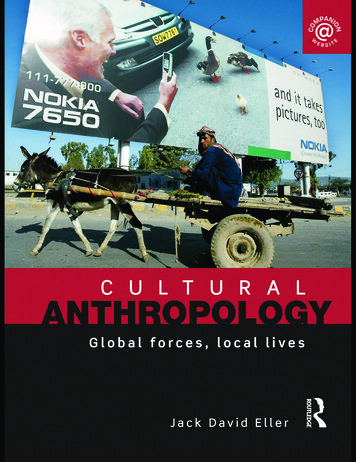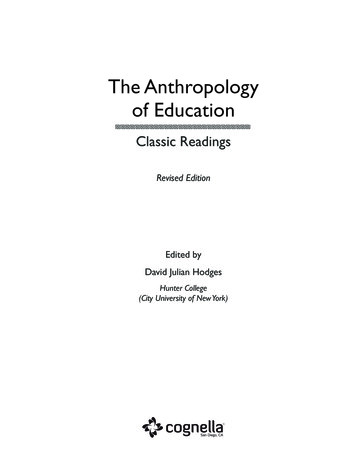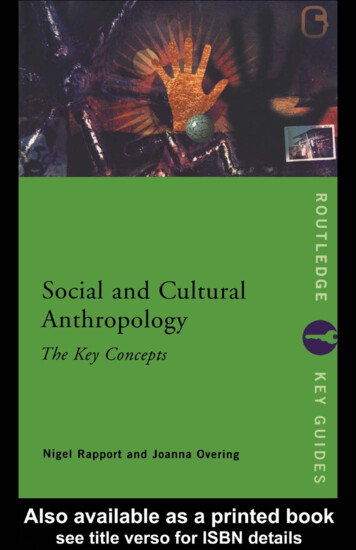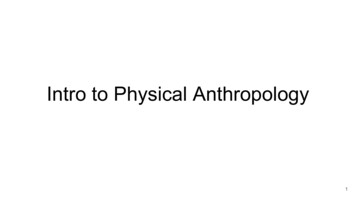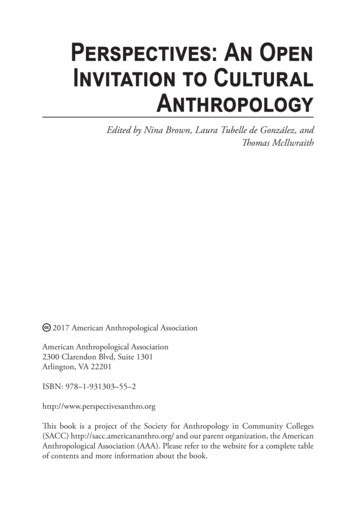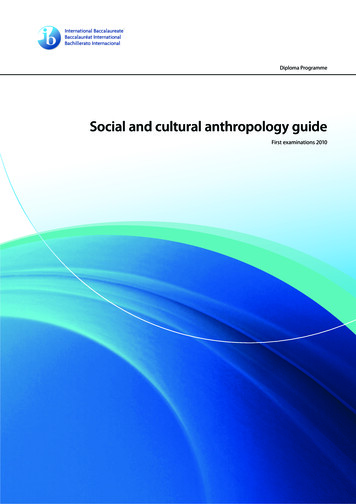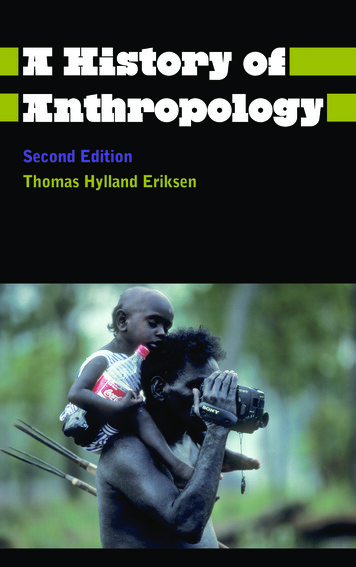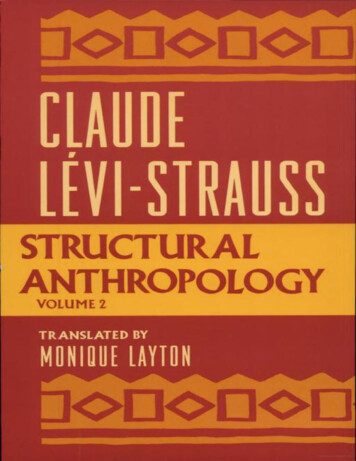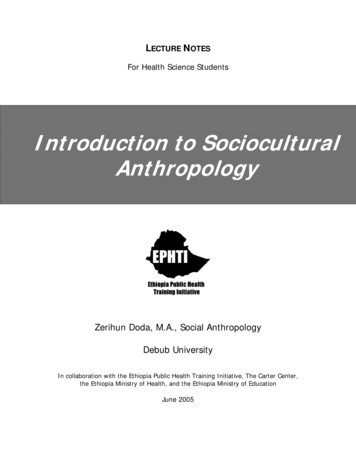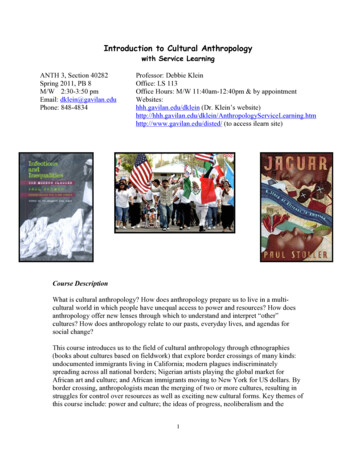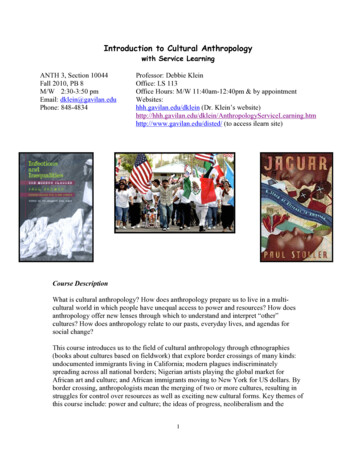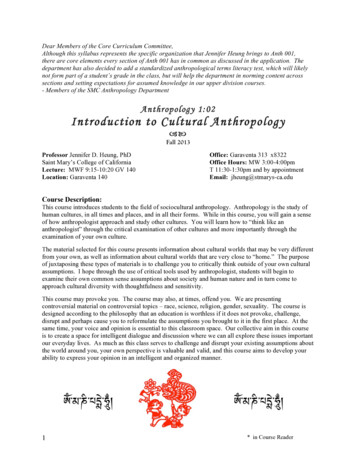
Transcription
Dear Members of the Core Curriculum Committee,Although this syllabus represents the specific organization that Jennifer Heung brings to Anth 001,there are core elements every section of Anth 001 has in common as discussed in the application. Thedepartment has also decided to add a standardized anthropological terms literacy test, which will likelynot form part of a student’s grade in the class, but will help the department in norming content acrosssections and setting expectations for assumed knowledge in our upper division courses.- Members of the SMC Anthropology DepartmentAnthropology 1:02Introduction to Cultural Anthropology Fall 2013Professor Jennifer D. Heung, PhDSaint Mary’s College of CaliforniaLecture: MWF 9:15-10:20 GV 140Location: Garaventa 140Office: Garaventa 313 x8322Office Hours: MW 3:00-4:00pmT 11:30-1:30pm and by appointmentEmail: jheung@stmarys-ca.eduCourse Description:This course introduces students to the field of sociocultural anthropology. Anthropology is the study ofhuman cultures, in all times and places, and in all their forms. While in this course, you will gain a senseof how anthropologist approach and study other cultures. You will learn how to “think like ananthropologist” through the critical examination of other cultures and more importantly through theexamination of your own culture.The material selected for this course presents information about cultural worlds that may be very differentfrom your own, as well as information about cultural worlds that are very close to “home.” The purposeof juxtaposing these types of materials is to challenge you to critically think outside of your own culturalassumptions. I hope through the use of critical tools used by anthropologist, students will begin toexamine their own common sense assumptions about society and human nature and in turn come toapproach cultural diversity with thoughtfulness and sensitivity.This course may provoke you. The course may also, at times, offend you. We are presentingcontroversial material on controversial topics – race, science, religion, gender, sexuality. The course isdesigned according to the philosophy that an education is worthless if it does not provoke, challenge,disrupt and perhaps cause you to reformulate the assumptions you brought to it in the first place. At thesame time, your voice and opinion is essential to this classroom space. Our collective aim in this courseis to create a space for intelligent dialogue and discussion where we can all explore these issues importantour everyday lives. As much as this class serves to challenge and disrupt your existing assumptions aboutthe world around you, your own perspective is valuable and valid, and this course aims to develop yourability to express your opinion in an intelligent and organized manner.1* in Course Reader
Course Aims:Upon completion of the course, students should be able to: Understand the role of social and cultural anthropology in the holistic approach of the fourfields of American anthropology Define culture, and articulate its historical relationship to the concepts of biological andsocial identity Demonstrate mastery of basic socio-cultural anthropology vocabulary words and theanalytical ideas that underlie their usage Apply anthropological terms and concepts in cross-cultural contexts to reflect and writesubstantively on ways in which human beings find fulfillment in community Apply anthropological methods of inquiry to cultural data and while engaging in culturalrelativism Demonstrate a capacity for coherent, principled analysis of concrete social problems utilizingemic and etic perspectives. Contextually recall case studies from around the world to demonstrate the range of humanvariability in the arenas of traditional anthropological inquiry (e.g., kinship, economics,politics, religion, linguistics) Display familiarity with a variety of anthropologists and their contributions to the discipline Read and summarize a peer-review journal article from an appropriate anthropologicaljournal, using anthropological writing and citation styles Articulate the contribution made by applied anthropology to understanding the contemporaryworld, including the legacy of colonial world systems, imperialism, and globalization inculture change and extinction Become familiar with a variety of theoretical perspectives that have been used inanthropology to illuminate micro- and macro-scale social and cultural processes over timeand spaceCourse Requirements and Evaluation:Attendance and Participation:Attendance at lectures is required and random quizzes will be conducted from time to time. Classbegins on time and students are expected to be present at the start of class. Students are expectedto be prepared to discuss assigned readings. Active and engaged participation in class is criticalto doing well in this course. Critical thinking is developed through the process of reading, writingand discussing concepts and theories with your fellow students and instructors, thus attendanceand participation will account for 10% of your final grade. Cultural Events: A portion of yourattendance and participation grade will include attending a cultural event and conducting a miniethnography. This will be a 1-2 page write up of the event and the people you spoke with.Additional details to this assignment will be discussed in class. There will also be one additionalrequired event students must attend. This will be discussed in class.Short papers:There will be three papers in this class. The types of papers expected are explained below:Regular Papers: (one 3-4 page, and one 5-6 page) Topics for these paper assignmentswill be announced in class. They will usually concern a topic or subject that was recentlydiscusses or may ask you to integrate several different points of view from class. The 34 page paper will be 10% of your final grade and the 5-6page paper will be 15% of yourfinal grade.2* in Course Reader
Article Review:To familiarize students with the vast field of anthropology, students will select an articlefrom an academic anthropological journal and review it. More details of this assignment(which journals to use, content etc) will be discussed in class. 3-4 pages are expected forthis paper. A library visit is also scheduled to help student familiarize themselves withanthropological journals. This assignment is worth 15% of your final gradeFinally, the papers are designed to give students an opportunity to reflect upon class materials in acreative fashion. This is a chance for you to practice “anthropological” ways of thinking, whileintegrating new concepts and theories with your own existing knowledge. Papers must be typed,double-spaced, with a 10-12 point font, and standard margins (1 inch). Late papers WILL NOTbe accepted.Exams: There will be two exams in this course, a mid-term (20%) and a final (25%). Allexams include a combination of short-answers, multiple-choice, true-false, and short and longessay questions. The exams will draw heavily on materials covered in lectures as well as all thereadings. The students will be responsible for all assigned readings, even those which may nothave been covered in class.Grading breakdown:Attendance and ParticipationQuizzes, homework, cultural eventPapers1@10% 2@15% Exams1@20% 1 @25% 10%5%40%45%100%Readings:Students are expected to complete all reading assignments before the lecture for which thereadings are assigned.There are four required texts for this course, three of which are available for purchase in the SMCbookstore. They have also been placed on reserve in the library. Please note that we will not bereading each text in its entirety, but selected chapters, which will be assigned in class.Course Reader: In addition to the books listed below, there is a course reader which will beavailable for purchase. More detail about when and where to purchase this reader will be given inclass. The readings provided in this course reader are REQUIRED. Readings in the coursereader are marked with an asterix (*) in the schedule of classes.Required Texts:Bourgios, Philippee (2002) 2nd Edition In Search of Respect: Selling Crack in el Barrio.Cambridge University Press.Nanda, Serena and Richard L. Warms (2009) Culture Counts: A Concise Introduction to CulturalAnthropology. Wadsworth.Nanda, Serena (1990) Neither Man Nor Woman: The Hijras of India. Belmont, CA:Wadsworth3* in Course Reader
Class Schedule**Note: Course schedule subject to modificationsto accommodate scheduling changes, developingstudent interests or other unforeseen incidents.**Week 1: Approaching Other Cultural WorldsWednesday 9/4: Introduction to the course, what is culture, what is anthropology, and the myths ofanthropologist.Friday 9/6 Translation, incommensurability, cultural relativism, and radically different ways of being.Readings: Nanda and Warms, Chapter 2 “Culture Counts” pp. 23-45*Horace MinerPaper assignment: Write a paper that “makes the familiar strange,” as Horace Miner did in “BodyRitual Among the Nacirema.” Do this by conducting your own mini-ethnography of some aspect of SMCor “Lamorinda” life. 3-4 pages. Due: Monday, September 23PLEASE BRING PAPER COPY TO CLASS *AND* SUBMIT ELECTONICALLY TOMOODLE.Week 2 : Tools of the trade. Myth and Culture.Monday 9/9 - Tools of the Trade: How do anthropologist work and what do they do? Basicanthropological methods: fieldwork, ethnography, ethnology.Readings: Nanda and Warms, Chapters 1(pp. 1-20) and 3 (pp 47-71)* Laura Bohannan Tiv in West AfricaWednesday 9/11Readings:Nanda and Warms, Chapter 12 (pp281-304)*Richard Lee - !Kung in the KalahariFriday 9/13 Myth is a reality lived: myths we live by.Readings:* Womack and Barker, “Adventures in the Field and in the Locker Room”Handout: Chagnon, “Doing Fieldwork among the Yanomamo”4* in Course Reader
Week 3 : More myth and culture.Monday 9/16 Origin myths, magic, and scienceReadings:*Malinowski, Magic, Science, and Religion.*Gmelch, George, Baseball MagicWednesday 9/18 Science, religion, economics, gender; origin myths.Readings:*Sapolsky, “Why We Want Their Bodies Back”*Daugherty, “Serpent-Handling as Sacrament”Friday 9/20Readings:Nanda and Warms, Chapter 12, “Religion”Week 4: Anthropological Approaches to ReligionMonday 9/23 Introduction to the anthropological study of religion; ways to understand religion in termsof historical origins, functions, cosmology, etc. Sacred/profane, clean/dirty. Religion as asystem of ordering the world. How the categories of religion are also implicit in ourmodes of science, gender.Reading:* Mary Douglas, Purity and Danger: An Analysis of the Concepts of Pollutionand Taboo. London: Ark Paperbacks.Wednesday 9/25 The concept of race and the rise of anthropology as discipline, why race is bogusbiological concept, why race continues to be an important cultural even though bogus;Franz Boas and the origins of modern American anthropology.Readings:*Gould, Steven J. (1985) The Mismeasure of Man. New York: W.W. Nortonand Co.Friday 9/27 Race, gender, and biology.Readings* Diamond, Jared “Race Without Color”* McIntosh, Peggy, “White Privilege” Unpacking the Invisible Knapsack”Week 5 : Race, Biology and Culture cont.Monday 9/30Readings:Wednesday 10/2Nanda and Warms, Chapter 11, “Inequalities: Race and Ethncity”Science as a “myth we live by;” sociobiologyReadings:*Richard Lewinton (1991) Biology as Ideology. New York: Harper Collins.Friday 10/4Reading : TBA5* in Course Reader
Week 6 :Monday 10/7REVIEW – No Readings.Wednesday 10/9Midterm Exam Part 1Friday 10/11Midterm Exam part 2Week 7 Myths of progress; capitalism.Monday 10/14Readings: *HANDOUT* Sahlins, Marshall (1972) “The original affluent society,” In Stone AgeEconomics. Chicago: Althone.Wednesday 10/16Readings: Nanda and Warms, Chapter 5, “Making a Living” and Chapter 6, “Economics”Friday 10/18Readings: Nanda and Warms, Chapter 8, “Sex and Gender”*Steinem, Gloria (1983) “ Outrageous Acts and Everyday Rebellions. New York: Hold,Rinehart and Winston.Week 8 Gender, identity, sex and destinyMonday 10/21Readings: *Ruth Hubbard (1990) The Politics of Women’s Biology.Wednesday 10/23 Gender vs. sex; sexuality; history of ideas of sex, gender, love, sexuality in the westand elsewhere.Readings: *Ann Fausto-Sterling, The Sciences March/April 199.Friday 10/25- MIDTERM BREAK – NO CLASSES!Week 9 Gender, identity, sex and destinyMonday 10/28Readings:Serena Nanda (1990) Neither Man Nor Woman: The Hijras of India. Belmont, CA:Wadsworth, Introduction, Chapters 1-3Wednesday 10/30Readings:Serena Nanda (1990) Neither Man Nor Woman: The Hijras of India. Belmont, CA:Wadsworth, Introduction, Chapter 4Happy Halloween!Friday 11/1Readings:Serena Nanda, Neither Mon Nor Woman: The Hijras of India, Chapter 56* in Course Reader
Week 10Monday 11/4Readings:Serena Nanda, Neither Mon Nor Woman: The Hijras of India, Chapters 6-8(pp. 71-112)Wednesday 11/6 :Readings: Serena Nanda, Neither Mon Nor Woman: The Hijras of India, Chapter 9 “Hijra Liveson Context” AND Chapter 10 “The Hijra in Cross-Cultural Perspective.”Friday11/8Readings: Nanda and Warms, Chapter 7, “Marriage, Family and Kinship”Week 11 :Monday 11/11Readings: *Gough, Kathleen (1971) from “Nuer kinship: a reexamination,” in the Translation ofCulture, T.O. Beidelman, ed. London: Tavistock, pp. 104-113.Wednesday 11/13Readings: *HANDOUT* Angrosino, Michael, “Conducting a Life History Interview”Bourgois, In Search of Respect Preface & Introduction pp. xvii-xxiii, 1-18Friday 11/15Readings: Bourgois, Chapter 1 (pp.19-47 )and part of Chapter 2 (pg48- bottom of 62)Week 12: In Search of RespectMonday 11/18Readings: Bourgois, rest of Chapter 2 (pg 62-76) and Chapter 3 (pp. 77-113)Wednesday 11/20Readings: Bourgois, part of Chapter 4 (pg 114- 146)Friday 11/22AAA Conference – No ClassWeek 13: In Search of RespectMonday 11/25Bourgois, Chapters (finish) 4, 5 & 6 (pp. 174-212, 213-)Wednesday 11/27 THANKSGIVING WEEKEND – NO CLASSFriday 11/29 THANKSGIVING WEEKEND – NO CLASS7* in Course Reader
Week 14 In Search of RespectMonday 12/2Readings: Bourgois, Chapters 7 and 8Wednesday 12/4Readings: Bourgois, Chapter 9 (conclusion) and Epilogue.Friday 12/6 Conclusion of the course: the boundary-crossings of anthropologyReadings: TBACourse FinalWednesday, December 11, 8:00-10:00pm. Garaventa 1148* in Course Reader
Wednesday 9/25 The concept of race and the rise of anthropology as discipline, why race is bogus biological concept, why race continues to be an important cultural even though bogus; Franz Boas and the origins of modern American anthropology. Readings: *Gould, Steven J. (1
